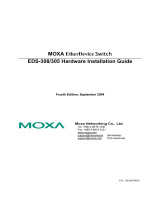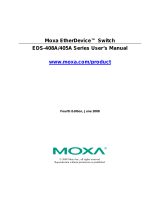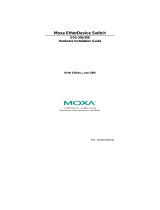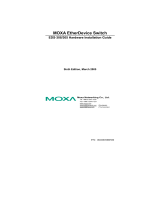
- 9 -
ATEX/IECEx Information
1. Certificate number: ATEX: DEMKO 18 ATEX 1978X
IECEx: IECEx UL 18.0089X (For EDS-408A copper and 2 Fiber model
only)
2. Ambient range:
-40°C ≤ Tamb ≤ 75°C for model with suffix –T only
-10°C ≤ Tamb ≤ 60°C for model without suffix –T only
3. Certification string:
ATEX:
EDS-405A Series: Ex nA nC IIC T4 Gc
EDS-408A Series (Copper Model EDS-408A(-T)):
Ex nA nC IIC T4 Gc
EDS-408A Series (2 Fiber Models EDS-408A-MM/SS(-T)):
Ex nA nC op is IIC T4 Gc
IECEx:
EDS-408A(-T), EDS-408A-MM/SS(-T): Ex nA nC IIC T4 Gc
4. Standards covered:
EN 60079-0:2012+A11:2013, IEC 60079-0 Ed.6,
EN 60079-15:2010, IEC 60079-15 Ed.4,
EN 60079-28:2015, IEC 60079-28 2
nd
version
5. The conditions of Safe usage for IECEx/ATEX (Zone2):
• Provisions shall be made to provide the transient protection to
be set at a level not exceeding 140% of the peak rated voltage.
• These devices shall be mounted in a suitable tool-accessible
ATEX/IECEx Certified enclosure rated to at least IP54 as defined
in EN/IEC 60529 and Pollution Degree 2 as defined in EN/IEC
60664-1, and used within their rated electrical and
environmental ratings.
6. The conditions of safe usage for other environments
• These products must be mounted in an IP54 enclosure.
• Install in an area of pollution degree 2 or less.
• Use a conductor wire of size 0.2 mm² or greater.
• Input Terminal Block (JP3, JP4) - Rated 300 V/12 A, solder on
the board, mating with plug-half connector suitable for 28-12
AWG (Sol, Str) wire size, torque value 4.5-5.0 lb-in. The
plughalf connection has a latching mechanism.
• Subject devices are to use conductors suitable for ≧95°C and
must be used for the Power Supply Terminal.
























